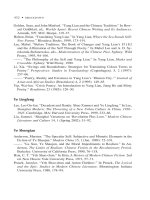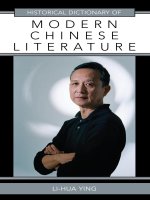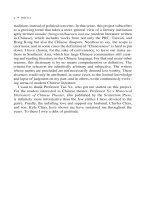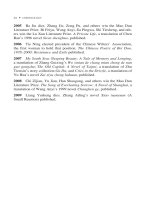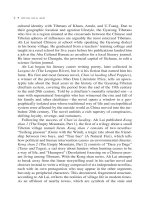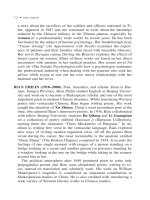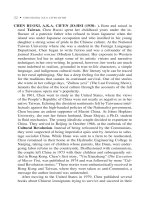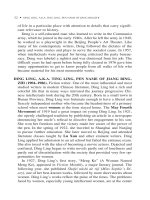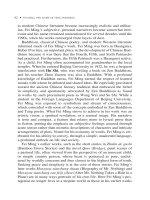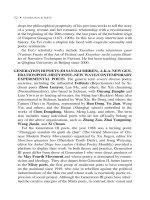"Historical Dictionary of Modern Chinese Literature" by Li-hua Ying - Part 24 ppsx
Bạn đang xem bản rút gọn của tài liệu. Xem và tải ngay bản đầy đủ của tài liệu tại đây (83.84 KB, 10 trang )
the father and continues through the various attempts that his wife and son
make to bring him home. The novel’s focus is on the son’s guilty feelings
about his mistreatment of his father, unfolding the tormented psychology
of a rebellious young man who strives to break free from the controlling
grip of traditional ethics. Bei hai de ren is an even more audacious revolt
against the realist tradition of storytelling. Characterized as a Joycean
novel in its absolute disregard for readability, it is the most radical depar-
ture from the standard form of the novel in modern Chinese literature. See
also MODERNISTS.
WANG XIAOBO (1952–1997). Fiction writer and essayist. Born in
Beijing, Wang Xiaobo spent several years as an educated youth in the
countryside of Shandong and Xishuanbanna, a tropical region in remote
Yunnan, and later attended the University of Pittsburgh. He went back
to Beijing in 1988 with a master’s degree and for the next few years
taught sociology and statistics in Beijing universities. His sudden death
from a heart attack at the height of his career was widely mourned and
considered a great loss to Chinese literature.
Wang’s sardonic wit, his ironic narrative style, and his profound
examination of the interplay between power and sex are brilliantly
captured in his Xishuanbanna stories, set in the lush landscape of the
border region of Yunnan during the Cultural Revolution. Huangjin
shidai (The Gold Times), Baiyin shidai (The Silver Times), Qingtong
shidai (The Bronze Times), and the unfinished novel Heitie shidai (The
Iron Times) are his main fictional works. In his characteristically sa-
tirical tone, Wang mocks the absurdities of life in Maoist China, where
ideology trumped basic human needs and stifled creativity. Of these
works, Huangjin shidai and Qingtong shidai are the best in representing
Wang’s style. Huangjin shidai is based on his personal experience as an
educated youth in Xishuanbanna and later as a worker in a small factory
in a Beijing suburb. Qingtong shidai, on the other hand, is a fictitious
novel in which the narrator makes frequent references to fantastic clas-
sical Chinese tales within a story about contemporary life. Other than
these novels, Wang also wrote short stories and many essays. He made
a foray into the movie industry with his screenplay Donggong xigong
(East Palace West Palace), a movie about homosexuality and power,
which won the Best Screenplay Award at the 1996 Mar del Plata (Ar-
gentina) International Film Festival. As an independent thinker who
preferred to remain on the periphery of society, Wang waged a lonely
202 • WANG XIAOBO
and courageous battle through his essays in his declarations against the
power of the state and the seduction of the market.
WANG XIAONI (1955– ). Poet, fiction and essay writer. Born in Changc-
hun in northeast China, Wang Xiaoni worked as a literary editor after re-
ceiving her B.A. from Jilin University. She moved to Shenzhen in 1985
and is currently on the faculty of Hainan University. Wang is widely
recognized in China for her poetry; among the honors she has received
is the 2002 Poetry Prize sponsored by the country’s three most influen-
tial poetry journals. Her early poems are devoted to the expression of
agrarian life. As she moves to include a wider spectrum of themes, she
maintains a fascination with the rural spirit of innocence and simplicity.
She is particularly interested in the details of everyday life and much of
her imagery is drawn from the world around her. Wang’s poetry, written
in a plain but precise language, expresses a gentle and graceful sensibil-
ity, a personal voice that emphasizes intimate feelings and emotions.
The most important of her fictional works is Fangyuan sishi li (Twenty
Kilometers Radius), which tells, in a fragmented style, a realistic story
of educated urban youth living in the countryside, where the dire condi-
tions of extreme poverty and lack of hope force young people to resort
to cruel measures in order to survive. See also WOMEN.
WANG XIAOYING (1947– ). Fiction writer. Born in Zhejiang Prov-
ince, Wang Xiaoying spent several years on a tea farm in Anhui as an
educated youth. She entered East China Normal University in 1978 to
study Chinese literature. Upon graduation, she was assigned to work
as an editor for a Shanghai literary journal. Since 1985, she has been a
member of the Shanghai Writers’ Association. Her major works include
the novellas Xinghe (The Milky Way), Suiyue youyou (Times in the
Past), and Yilu fengchen (A Journey of Hardships), and the novels Ni
weishui bianhu (Whom Are You Defending), Wemen cengjing xiangai
(Once Upon a Time We Were in Love), and Danqing yin (Inspired by
Art). Wang’s style of writing is realistic and her works primarily deal
with contemporary life, issues such as love, marriage, and work, as well
as changes in human relationships during the age of globalization. See
also WOMEN.
WANG XUFENG (1955– ). Novelist. Winner of the Mao Dun Literature
Award, Wang Xufeng is known for the “tea trilogy,” a project that took
her 10 years to complete. She grew up in Zhejiang, which has a long
WANG XUFENG • 203
tea-growing history, and has worked in a tea museum in Hangzhou. An
expert in tea culture, from its growing to its appreciation in high society,
Wang has turned her knowledge into a saga of a Hangzhou family’s re-
lationship with tea for the past 150 years. Part 1 of the trilogy, Nanfang
you jiamu (Quality Tea Grows in the South), focuses on the sociopoliti-
cal changes affecting the tea growers in the late Qing dynasty; part 2, Bu
ye hou (The Marquis of the Night), is set against the background of the
Sino-Japanese War, and part 3, Zhu cao wei cheng (A City Surrounded
by Plants), deals with the tumultuous years of the Cultural Revolution.
The main theme of the trilogy is how civilization conquers brutality
and culture survives violence. Tea represents the human spirit. Well
researched and rich with details about growing, picking, making, and
drinking tea, the tea trilogy is considered more than a fictional work; it
is regarded also as a scholarly work written by a specialist in the field.
See also WOMEN.
WANG ZENGQI (1920–1997). Fiction writer and playwright. Born
in Gaoyou, Jiangsu Province, Wang attended Southwest United Uni-
versity in Kunming during the Sino-Japanese War and studied with
Shen Congwen, who greatly influenced his writing. Wang was one of
the very few writers whose career spanned nearly half a century. He
published his first story in the 1940s, and continued to write during the
Cultural Revolution and into the 1980s. From 1962 until his death, his
official job was writing librettos for the Beijing Opera Troupe. He was
one of the main writers of Shajia bang (The Shajia Creek), a revolution-
ary opera promoted by Mao’s wife Jiang Qing. Wang reached the height
of his creative career in the post-Mao era, with the publication of numer-
ous short stories and essays. He is noted for his graceful style and lyrical
sensibility, a legacy seen as passed down from Shen Congwen. A kind
of godfather figure in the root-seeking movement of the 1980s, Wang
also shared Shen’s interest in cultures far removed from modernity,
which were further explored by younger writers such as Han Shaogong
and Zheng Wanlong.
Wang grew up in a landed family that was deeply rooted in Chinese
traditions. His father was an easygoing man of many talents, a lover
of literature and an accomplished musician, painter, calligrapher, and
athlete, who greatly influenced his son. Like the rest of his genera-
tion, young Wang received both the traditional and modern forms of
education. Toward the end of his career, however, it was Chinese
204 • WANG ZENGQI
traditions that had the greatest impact on his writing. His stories and
essays are permeated with traditional sentiments. Many of his char-
acters, such as the friends in “Suihan sanyou” (Three Friends in the
Cold of Winter) exhibit the Confucian ideals of social engagement,
moral uprightness, and human benevolence. The characters with Tao-
ist inclinations are portrayed as having no ambitions other than living
peacefully in the world and tending their personal interests: growing
flowers, fishing, and cultivating artistic tastes. The laborers in “Da
nao jishi” (A Tale of the Big Lake), an award-winning story, dem-
onstrate contentedness with life and tolerance of others. “Fuchou”
(Revenge), based on an account from the Buddhist sutras, tells how
a fatal revenge is averted. “Youming zhong” (When the Death Bell
Tolls), another story of Buddhist themes, conveys the compassion of
monks. “Shoujie” (The Love Story of a Young Monk), which also won
an award, portrays a monastic life without rigid rules. In the temple,
the monks sing love songs, play cards, and even get married and
have children. Leading a natural life of simplicity and freedom, they
represent the ideals of Zen Buddhism as advocated and practiced by
men of letters in ancient China. It was precisely this attitude toward
life that helped Wang survive the decades of political vicissitudes.
His personal convictions, which include kindness to others, living in
harmony with society and nature, and a strong belief in humanity, are
themes explored in his fiction and essays.
WANG ZHENHE, A.K.A. WANG CHEN-HO (1940–1990). Fiction
writer. Born and educated in Taiwan, Wang Zhenhe is considered a
nativist writer whose concerns for the lives of ordinary, downtrodden
people feature prominently in Taiwan’s realist tradition. He is also a
superb satirist; humor runs through nearly all his works. “Jiazhuang yi
niuche” (An Oxcart for Dowry) relates how a man gets an oxcart from
a small garment merchant with whom his wife has been having an af-
fair. All three characters live on the fringes of society, left behind by
rapidly modernizing Taiwan. Wang depicts in a satirical language, but
with great compassion, the tensions that exist in their everyday lives
and their wretched conditions, including physical deformity as well as
an apparent lack of morality. The comic voice is put to its full use in his
novel Meigui meigui wo ai ni (Rose, Rose I Love You). Wang employs
an alternately riotous, sardonic, and serious tone to address the issue of
moral degradation in Taiwanese society. The novel sheds light on the
WANG ZHENHE, A.K.A. WANG CHEN-HO • 205
exploitation of women in the prostitution industry boosted by the arrival
of American G.I.s.
WEI HUI, PEN NAME OF ZHOU WEIHUI (1973– ). Novelist. Born
in Yuyao, Zhejiang Province, and graduated from Fudan University,
Wei Hui is a representative of the New Generation Writers (Xin sheng
dai zuojia). A self-described exhibitionist writer whose works deal with
urban, materialistic life in contemporary China, Wei Hui is best known
for her sexually explicit novels, Shanghai baobei (Shanghai Baby)
and Wode chan (Marrying Buddha). Her books provide a window into
the hedonistic lifestyle of modern materialistic youths obsessed with
money, sex, and brand names, a far cry from the revolutionary idealism
embraced by the older generations of the Mao era. See also WOMEN.
WEI MINGLUN (1941– ). Playwright and essayist. Born and raised in
small towns in Sichuan, Wei Minglun began making a living as a Sich-
uan opera actor when he was only nine years old. With virtually no for-
mal education, he taught himself how to read and write and moved his
way up to become a leading playwright in modern Chinese theater. He
has won numerous prestigious awards and is widely known as a “wizard
of the theater.” Wei rose to prominence in the 1980s when he wrote and
directed several influential Sichuan operas, including Yi Dadan (The
Fearless Yi), Pan Jinlian (Pan Jinjian: The History of a Fallen Woman),
and Bashan xiucai (The Talented Scholar of Sichuan). He continued to
bring out more box office successes in the 1990s with the productions
of Xi zhao Qishan (Sunset at Mount Qi), Zhongguo gongzhu Dulanduo
(Dulanduo: A Chinese Princess), and Bianlian (Masque Changing).
Wei divides his plays into “women’s plays” and “men’s plays.”
The most important among the former is the controversial Pan Jin-
lian, generally characterized as the pinnacle of the absurd in Chinese
theater. Pan Jinlian is Wei’s attempt to reexamine a despised woman
from classical Chinese popular literature and give her a new interpre-
tation. The play crosses boundaries of time and space and gathers,
on the same stage, famous characters, both historical and fictional,
including Empress Wu (624–705) of the Tang dynasty, author Shi
Nai’an (1296?–1370?) of the Ming dynasty, Leo Tolstoy’s Anna Kar-
enina, Cao Xueqin’s Jiao Baoyu, a county magistrate of ancient China,
a present-day judge, and others. The interaction of these diverse char-
acters results in “absurd” circumstances, such as 20th-century hooli-
gans colluding with Ximen Qing, who is Pan’s nemesis in Shi’s novel,
206 • WEI HUI, PEN NAME OF ZHOU WEIHUI
and Anna Karenina taking Pan Jinlian with her to commit a double
suicide. Of the “men’s plays,” Xi zhao Qishan is the most representa-
tive of Wei’s art. It once again shines critical light on a well-known
figure, Zhuge Liang, of the classical novel Sanguo Yanyi (Romance of
the Three Kingdoms). Through this beloved character, the play reas-
sesses the moral attributes of the traditional Chinese literati. See also
SPOKEN DRAMA.
WEN YIDUO, PEN NAME OF WEN JIAHUA (1899–1946). Poet. Be-
fore entering Qinghua University, Wen received a traditional education
in Hubei, his home province. In 1922, he went to the United States to
study fine arts and literature at the Chicago Art Institute. It was during
this time that his first collection of poetry, Hong zhu (Red Candle), was
published in China. He returned to Beijing in 1925 and became a litera-
ture professor. In 1928, his second collection, Si shui (Dead Water), was
published. In the same year, he joined the Crescent Society. When the
Japanese invaded China, Wen moved with his university to Kunming,
Yunnan, where he became politically active. His public denounciation
of the Nationalist government eventually cost him his life, when he was
assassinated in 1946.
Wen’s poetry reflects two aspects of his life. As a scholar and pro-
fessor of Chinese literature, he paid attention to intrinsic elements of
literary form. As a politically engaged intellectual, he showed a deep
concern for his country and people. For these two reasons, he was
regarded as both a “formalist” and “patriotic” poet. In reaction to the
trendy practice of showing total disregard for form, he wrote essays to
advocate “formal properties” for the new poetry. These essays as well as
his poems established his position as a leader of modern poetry. See also
NEW CULTURE MOVEMENT; SINO-JAPANESE WAR.
WOESER (1966– ). Poet and prose writer. Woeser was born in Lhasa.
Her father, a military officer with mixed Chinese and Tibetan parent-
age, joined the People’s Liberation Army at the age of 13 and rose to
be an army officer stationed in various places in Tibet, a position that
afforded his daughter the opportunity to be educated in Sichuan Prov-
ince from a young age. Woeser graduated from Southwestern College
for Minorities, where she majored in Chinese language and literature. In
1990, she returned to Lhasa to edit Xizang Wenxue (Tibetan Literature)
and began writing poetry. She was reconnected to her Tibetan heritage
and became interested in Buddhism. In Lhasa, she had access to books
WOESER • 207
smuggled into Tibet, including In Exile from the Land of Snows: The
Dalai Lama and Tibet since the Chinese Conquest by John F. Avedon,
which opened her eyes to a historical narrative about Tibet contrary to
what she had received in her formal education. Such books transformed
her into an activist, a public speaker for the suppressed Tibetan col-
lective memory. Shajie (Revolution), an oral history of Tibet during
the Cultural Revolution, publishes more than 300 photos taken by
her father and the eyewitness accounts from her interviews, providing
testimony about the widespread destruction of Tibetan culture. Her out-
spoken criticism of the Chinese government and her open admiration
for the Dalai Lama jeopardized her position at Xizang Wenxue and her
ability to publish in China. She has, however, been able to find publish-
ers in Taiwan and Hong Kong.
Woeser’s literary works, both poetry and prose, center on one theme:
the eternal as represented in Tibetan Buddhism. In Xizang: Jianghong
se de ditu (A Crimson Map), the author talks about the monasteries, the
lamas, and the pilgrims and expresses her nostalgia for the disappearing
Tibetan civilization. In Xizang biji (Notes of Tibet), a collection of es-
says and her best-known work, she explores the Tibetan consciousness.
Her works document suppressed history, memorialize forgotten suffer-
ings, and retrieve erased footprints. While recording her travels in Tibet
to visit various sites and interview various personalities, she indulges in
a personal and internal wandering, immersed in a world of dreams and
memories. Her poetry is romantic and surreal, enhanced by the pathos
of the Tibetan nation and by her own sense of loss and sentimentality.
Her other works include a poetry collection, Xizang zai shang (Tibet:
The High Plateau), Ming wei Xizang de shi (Poems Written for Tibet),
and Xizang jiyi (Memories of Tibet). See also WOMEN.
WOMEN. In 20th-century China, the women’s emancipation movement
began as part of the modernization agenda of the May Fourth Move-
ment, which sought to transform China into a modern nation. The May
Fourth intellectuals called for the education of a whole generation of
“new women,” physically fit and mentally strong, to join the nation-
building project. In order for women to participate in social reforms,
traditional institutions that had subjugated them to practices such as
foot-binding, arranged marriage, deprivation of education, and other
forms of institutionalized discrimination against women had to be
dismantled. On the political and legal front, reform-minded activists
208 • WOMEN
argued that since women’s equality was predicated on economic inde-
pendence, laws should be passed to guarantee women legal rights to
inherit property, a privilege only sons could enjoy in previous societies.
In the campaign to give women economic independence and freedom,
consensual marriage and women’s right to divorce their husbands
were also put on the table. Based on the principles of gender equality
and property ownership, the new legal codes passed in 1928 and 1929
granted Chinese women inheritance rights and freedom in marriage
and divorce. The goals to acquire equal rights for education were also
achieved. By the end of the 1920s, modern educational institutions at all
levels were open to girls.
In the initial stage of the women’s emancipation movement, progressive
male intellectuals were major advocates and they used literature as an
important tool to embolden and mobilize women. Henrik Ibsen’s play A
Doll’s House, for example, was translated into Chinese and introduced
by Hu Shi in the progressive journal Xin qingnian (New Youth) in
1918. Its main character Nora became synonymous with awakened
and liberated women. Many characters modeled after Nora appeared in
plays written by Chinese authors. Ouyang Yuqian’s Pofu (The Shrew)
and Pan Jinlian (Pan Jinlian the Seductress) and Yuan Changying’s
Kongque dongnan fei (Southeast Flies the Peacock) all feature female
characters who fight for personal independence. Encouraged by these
examples, many Chinese women ran away from home to become free
agents in their own right.
In no small measures, women’s writings in the early 20th century
appropriated the male discourse on women’s emancipation, but soon
they developed a voice of their own. While the writings of Xie Bingy-
ing, Bing Xin, Lu Yin, Xiao Hong, Mei Niang, and others clearly
subscribe to much of the emancipation ethos promoted by male authors,
embracing the struggle against arranged marriage, the right to educa-
tion, and gender equality, works by Ling Shuhua and Ding Ling,
while deploring the gender-specific confinements imposed on women
by traditional societies, insisted that women’s claim to subjectivity and
intellect be accompanied by an emphasis on the development of strong
female emotional and sexual desires. Later in the 1940s, Su Qing and
Zhang Ailing brought women’s writings to a whole new level. Su’s
prose, imploring her readers to understand the challenges faced by ca-
reer women in the workplace as they struggled to make a living while
defending their dignity and freedom, is surprisingly still relevant in
WOMEN • 209
today’s society. Zhang Ailing, while depicting urban trivia, delves deep
into the psyche of women and men as they engage each other in the
game of love and desire.
In modern Chinese literary discourse, the women’s emancipation
movement that started in the early 20th century has never truly con-
cluded to this day, and women’s struggle for autonomy has been a
recurring theme in women’s writings. From Yuan Qiongqiong, Li
Ang, and Shi Shuqing to Chen Ran, Xu Xiaobin, Hong Ying, and
Lin Bai, the spotlight is focused on the female body in the belief that
the raw intensity of female sexuality embodies women’s sense of self
and is therefore a crucial component of the female identity. If the
emphasis on the female body is narrowly and internally focused, the
fascination with the matrilineal found in the works by such writers
as Wang Anyi, Tie Ning, Zhang Jie, and Zhao Mei is by definition
grand and epical. Wang’s Jishi yu xugou (The Real and the Fictitious)
engages in mythmaking that takes the female narrator to where her
maternal ancestry began—the grassland of the northern prairie; Tie’s
Meigui men (Gate of Roses), Zhang’s Wu zi (No Written Word), Xu’s
Yu she (Feathered Snake), and Zhao’s Women jiazu de nüren (Women
in my Family) all trace back to their female ancestors to uncover the
spring of strength or roots of madness that contribute to the current
mental state of the female protagonists. By reclaiming or recreating
the matrilineal records, which have been suppressed or erased by the
male-dominated history-making enterprise, these women writers have
attempted to rewrite not only individual clan history but also the history
of the nation.
It goes without saying that not all women writers prefer to deal
with women’s bodies or matrilineal history, or the domestic scene,
and every good writer possesses a highly individualized autonomous
aesthetic. So characterizing women’s writings in one way or another is
no doubt risky. Nevertheless, there seems to be a remarkable consensus
among critics with regard to the so-called feminine aesthetic of Zhang
Ailing’s writing—known for its meticulous focus on social trivia and its
exquisite descriptiveness of the sounds and sights of the urban scene, a
style much imitated, even by male writers. The notion of the domestic
as the privileged topos for women writers, for better or for worse, is
widely accepted as a trademark of the so-called Zhang (Ailing) style.
Wang Aiyi, Yuan Qiongqiong, Zhu Tianwen, Zhu Tianxin, Zhong
Xiaoyang, and Bai Xianyong are all considered heirs to this feminine
210 • WOMEN
aesthetic. See also AN QI; BI SHUMIN; CAN XUE; CAO ZHILIAN;
CHEN RUOXI; CHENG NAISHAN; CHI LI; CHI ZIJIAN; FAN
XIAOQING; FANG FANG; FENG YUANJUN; HUANG BIYUN;
HUO DA; LI BIHUA; LIAO HUIYING; LIN HAIYIN; LIN HUIYIN;
LIU SUOLA; LU XING’ER; MA LIHUA; METSO; NIE HUALING;
OUYANG ZI; PING LU; RU ZHIJUAN; SAN MAO; SHEN RONG;
SHU TING; SU DE; SU WEIZHEN; SU XUELIN; WANG HAILING;
WANG PU; WANG XIAONI; WANG XIAOYING; WANG XUFENG;
WEI HUI; WOESER; XI MURONG; XI XI; XIA YI; XIAO HONG;
XIAO LIHONG; XU KUN; YAN GE; YAN GELING; YANG JIANG;
YANGDON; YE GUANGQIN; YI SHU; YO YO; YU LIHUA; ZHAI
YONGMING; ZHANG ER; ZHANG JIE; ZHANG KANGKANG;
ZHANG XIAOFENG; ZHANG XIN; ZHANG XINXIN; ZHANG
YUERAN; ZONG PU.
WU ZUGUANG (1917–2003). Playwright, and fiction and prose writer.
A legendary figure in Chinese art and literary circles, Wu Zuguang was
one of the last generation of Chinese men of letters who distinguished
themselves in more than one area of Chinese cultural life. His career
stretched across several disciplines: theater, film, poetry, calligraphy,
and scholarly pursuits. Born in Beijing to a well-established family that
prided itself for learning and literary accomplishments, Wu earned a
reputation as a dramatist in the 1930s and 1940s with several critically
acclaimed plays, including Fengxue ye gui ren (Returning at a Snowy
Night), generally regarded as a masterpiece. Influenced by the May
Fourth New Culture Movement, the play accentuates the conflicts be-
tween the pursuit of personal happiness and traditional values that choke
individualism. The main characters, a Peking opera star and a concubine
of a judge, fall in love with each other despite social pressures. When
they muster enough courage to elope, they are dealt a fatal blow and
their dreams for a happy life together end tragically.
Wu also adapted stories from classical Chinese literature and history
into stage plays. Zhengqi ge (Song of Righteousness), about the 13th-
century patriot Wen Tianxiang who fought the Mongols, the mythical
love story Niulang Zhinü (The Cowherd and the Weaving Maid), and
Lin Chong ye ben (Lin Chong Leaving at Night), based on the classi-
cal novel Shui hu (Water Margin), are all taken from existing sources.
He also wrote opera scripts such as San da Tao Sanchun (Tao Sanchun
Receives Three Beatings), San guan yan (Banquet at Three Passes), and
WU ZUGUANG • 211
